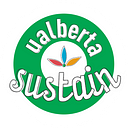
Remote Teaching
Whether on the African savannah or Zoom, Audrey Reid is getting her students excited about sustainability
By Olivia DeBourcier
Audrey Reid has taught everywhere from the CCIS lecture halls to the African savannah. And while one is certainly a bit warmer than the other, both places offer opportunities to engage students in learning about sustainability.
Growing up in Vermont, Reid was surrounded by a community interested in environmental conservation. In 2016 she got her PhD in freshwater ecology at the University of Toronto Mississauga. She has since gone on to teach numerous courses at the University of Alberta including BIOL 208 Principles of Ecology, BIOL 364 Freshwater Ecology, and BIOL 381 A Planet in Crisis.
“I feel like my contribution to the environmental movement is teaching and getting students excited about environmental and ecological topics,” said Reid. “That really is like my goal in my job.”
She has also been the academic coordinator of the Southern African Field School which, in pre-pandemic years, brought students to South Africa and Eswatini for a hands-on course in field methods and biology.
The Southern African savannah is a vastly different environment from a lecture hall. Her students conducted field research and labs in the mornings and had lectures in the afternoon. They worked out of the Savannah Research Centre with local Swazi scientists, which allowed them to present labs on all kinds of topics! Everything from studying giraffe vigilance behaviour to surveying macroinvertebrates in sugar cane plantation runoff streams.
“What ecologist wouldn’t want to learn outdoors?”
Traveling 15,000 km to teach without a net proved incredibly rewarding for Reid. “I find that field courses naturally draw in student interest much more so than classroom based courses,” said Reid.
“While teaching in a remote field camp was logistically hard, from a pedagogical point of view, it was fantastic.”
Teaching in the field showed students that environmental challenges are complex and not always easy to solve. In Eswatini, wildlife poaching and illegal trafficking are huge issues — but so is poverty. Many poach as a last resort. Students learned that any solution to poaching they could propose needed to take into account social and economic complexities of affected communities.
“It also helps students realize that environmental and social justice issues aren’t just a problem for ‘over there,’” said Reid. After all, “access to clean water can be as big of an issue in some areas of Southern Africa as for Indigenous communities here in Canada.”

“The savanna was my classroom, and it was great to be able to teach students a concept, then show it in action in a natural setting. It was also amazing working with Swazi ecologists in the area, and to be able to learn about Swazi natural history and culture directly from the experts.”
Teaching in transition
Recently, the Department of Biological Sciences has decided to close the Southern African Field School and instead will offer a new BIOL 395 Field Course in Biology in different locations each year. They hope to return again to Southern Africa some time in the future, and will launch the new course once travel restrictions are relaxed.
But whether teaching back in the classroom or remotely, as she has for the past year, Reid always aims to engage students in sustainability. And she sees that the times are ripe for deeper education on climate issues, in particular.
“In my undergrad we were talking about those issues in our classes and wanting to organize or do something, but it felt like this fringe issue,” said Reid. “These are not fringe issues anymore. These are the issues.”
She sees how her students began to interact differently with her course material as the climate movement took shape around the school strikes and the rise of groups like Extinction Rebellion.
“Teaching ecology during fall 2019 was really exciting because that was when the school strikes were really going,” said Reid. The energy was thrilling — but also desperate. For some, learning about environmental issues and climate change in every class was emotionally exhausting.
According to Reid, navigating the balance of positive and negative is a big part of teaching these concepts. “I think it’s really important to show students that there are options and not to take the cynical nihilist approach of, ‘Oh, we’re screwed. There’s nothing we can do.’ Because there really are options out there.”
Despite the challenges presented by the pandemic, instructors are continuing to push on and teach through the screens. For Reid this means continuing to ensure that students are getting the education of sustainability they need to contextualize the changes happening around them, and to apply it to future solutions.
Audrey Reid is a member of the Sustainability Council’s Affiliate Network. Sign up to join our community of academic staff teaching and researching sustainability.
